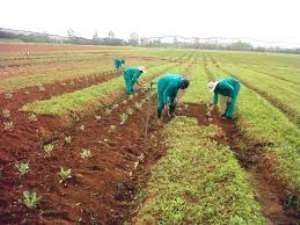
Accra, July 17, GNA - A study on fertilizer application in Ghana has revealed that only 59 per cent of farmers apply inorganic fertilizer on their farms.
The study showed that farmers in the savannah zone of Ghana were more likely to apply fertilizer than their counterparts in the forest zone because most of the soils in the north are more degraded than the south.
The proportion of farmers applying fertilizer is higher in the Upper East Region, which stood at 93.5 per cent, followed by the Northern Region with 87.5 per cent and the Brong Ahafo Region with 40.4 per cent with the Ashanti Region having the lowest rate of application of fertilizer of 22.1per cent.
Mr Charles Nyaaba, the Programmes Officer of the Peasant Farmers Association of Ghana, who commissioned the study, said government had since 2008 invested so much in Fertilizer Subsidy Programme with the aim of improving access and utilisation of fertilizer by small holder farmers who are majority of the farmer population in Ghana.
He said the study showed that the fertilizer subsidy programme achieved its objective of increasing fertilizer application to at least 50kg/ha as stated in the 2006 Abuja Declaration but in terms of increasing yields, the research could not establish that, especially as the agricultural contribution to Gross Domestic Product had experienced a declined in recent times.
'According to the research this could be due to lack of soil fertility profile in the various ecological zones, hence any fertilizer is applied on any soil,' he added.
Professor Joseph Awetori Yaro, Lecturer, Department of Geography at the University of Ghana, said the survey recommended that the fertilizer subsidy programme must be a short-term measure in solving the productivity problem.
He said in the long term, government must adopt a more holistic approach in improving soil fertility, including investing in the use of organic fertilizers.
He said fertilizer imported into the country did not meet soil requirement and, therefore, a wasted investment.
Prof Yaro said government should create the enabling environment for the private sector to enter into soil testing as a business or, on the other hand, government could reduce subsidy amount and spend savings to undertake soil testing.
'When soil testing system is established, farmers must present soil testing certificates showing the type of fertilizers needed as a pre-condition to qualify for the subsidy programme,' he said.
The research also recommended reduction of taxes and other administration expenses in ECOWAS member countries to help reduce the high cost of fertilizer business so that many farmers could afford, Dr Joseph Kofi Teye, a Lecturer at the Department of Geography, University of Ghana, said.
He said there should be the creation of conducive environment for private sector participation to bridge the gap in agricultural research and development, farmer education, farmer database information and institution of measure that would make fertilizer business attractive for both the demand and supply side of the chain.
'Government should allocate portion of the subsidy component to support monitoring of fertilizer subsidy implementation; labeling or coloration of subsidised fertilizer and ensuring early supply of fertilizers to farmers,' he said.
The research was funded by Alliance for Green Revolution in Africa.
GNA
By Morkporkpor Anku, GNA




 Dumsor: Energy sector ‘shepherdless’ – Nana Amoasi VII
Dumsor: Energy sector ‘shepherdless’ – Nana Amoasi VII
 Train accident: Four more grabbed and remanded
Train accident: Four more grabbed and remanded
 Gov't to consolidate cash waterfall revenue collection accounts
Gov't to consolidate cash waterfall revenue collection accounts
 Gov't to settle lump sum for retired teachers by April 27
Gov't to settle lump sum for retired teachers by April 27
 Former PPA CEO granted GH₵4million bail
Former PPA CEO granted GH₵4million bail
 Dumsor: The darkness has exposed you; you’ll go down as the worst in Ghana’s his...
Dumsor: The darkness has exposed you; you’ll go down as the worst in Ghana’s his...
 Dumsor: The ‘incompetent’ person provided a timetable whiles those who came to s...
Dumsor: The ‘incompetent’ person provided a timetable whiles those who came to s...
 Defend, ensure NPP’s good works are ‘sold’ and highlight the ‘bad’ state of the ...
Defend, ensure NPP’s good works are ‘sold’ and highlight the ‘bad’ state of the ...
 Bawumia will rank high ahead of Mahama in any anti-corruption test — Salam Musta...
Bawumia will rank high ahead of Mahama in any anti-corruption test — Salam Musta...
 NPP trying to bribe us but we‘ll not trade our integrity on the altar of corrupt...
NPP trying to bribe us but we‘ll not trade our integrity on the altar of corrupt...
